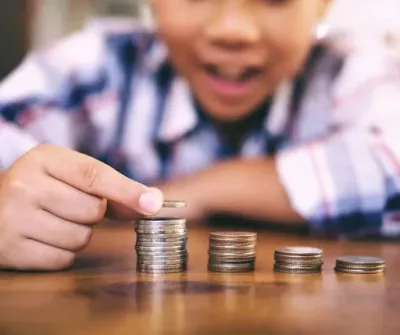How to Teach Children About Money in 7 Easy Steps
Money can be a
touchy subject for kids and parents alike, but it's also a topic that needs to
be discussed. We want our children to understand the value of money and how it
works, but it can be tricky to discuss these concepts without sounding preachy.
As a parent myself, I've found that making learning about money fun is one way
to get my child interested in the topic without worrying about them feeling
like we're pushing an agenda or being lectured at. Here are some fun ways that
you can teach your child about money:
Let kids invent their own games or create their own money.
Let kids invent
their own games or create their own money. This works especially well with
older children who already have a grasp on financial concepts like spending,
saving, budgeting and investing. Let them create their own games using whatever
they want as currency — anything from marbles to candy to paper clips could
work! If they want to make up actual rules for using this new currency (for
example: "If you want something from someone else at the table, you have
to pay them five coins"), that's fine too! The point is not just for them
to play with their new money but also for them to learn how economics work in
general.
Encourage your
child to brainstorm rules for these games as well—they might decide that one
dollar is worth 10 cents if it’s raining outside! Or maybe if someone doesn't
pay up when he owes another player $5 dollars then he has to go without lunch
tomorrow? The possibilities are endless!
Play online financial video games for kids
There are some financial video games for kids that you can play at home with your child. These games provide an opportunity to talk about how much things cost and how much they should spend on each item. Some of them are free and ad-free online video games for kids like Cash Back. The game of change involves giving customers exact change using bills and coins.
Another good
virtual game is the Treze Coins.
It is a simple money addition game. Children add coins to deposit into a
gumball machine like a real-life version of the classic coin game.
It is important to talk to your child about mone their money while they're playing. Ask them to show you how they usedy in the game. How much did they save? Where did they spend it? What could have happened if they didn't save or didn't spend wisely?
Talk about your
own experiences with saving and spending money, too—they may be interesting and
relevant to the game you're playing!
Have kids plan and budget for special wishes, such as a new game or toy.
Start by asking
them what they want and how much it costs. Then help them set a realistic
budget and see if they can save up enough money using a part of their allowance
and by doing chores around the house.
Let kids buy
something small with their allowance (or birthday money). Letting them make
this choice will give them more confidence in making decisions on their own —
which is important when it comes to managing money later in life!
Give kids
chores they can do around the home that will earn extra cash. Have them save up
for something special, such as a trip to the zoo or amusement park.
Explain the value of hard work.
Explain the
value of hard work, rewarding children with additional 'pay' for completed
house chores or rewarding them for their academic achievement.
Play board games that involve money.
Play board
games that involve money, such as Monopoly and Life. These games are a great
way to learn about economics because it require you to think strategically,
balance risk and reward, and weigh short-term gain against long-term goals.
They will learn
how to create a budget and plan for the future and learn how to earn interest on
investments.
Teach children to save for a rainy day.
Teach children
to save for a rainy day and explain what an emergency fund is and how it works.
Teach them how
to calculate how much they need to save in order to reach their goals at each
stage of life (e.g., college, car, house).
Show them how to keep track of their savings goals using a spreadsheet or app so they can see at a glance where they are on their way towards those goals!
Children will learn about money while they're having fun.
Bring your kid
with you when you go grocery shopping so they can learn how much everything
costs and how to budget accordingly!
Introduce different
forms of currency — whether it's coins, bills or credit cards — by talking
about how each one works and what its purpose is (e.g., coins are used for
change; bills are used for large purchases). Encourage them to practice
counting out change from their piggy bank or allowance if they have one so they
get familiar with the different denominations of currency.
Teaching your
children about money matters is not only important, it’s fun. We hope these
tips have encouraged you to talk to your kids about money. Keep in mind that
it’s never too early—or too late—to start talking about money with your
children. And don’t forget: if all else fails, just get them excited about
saving for the latest gadget!






Comments
Post a Comment